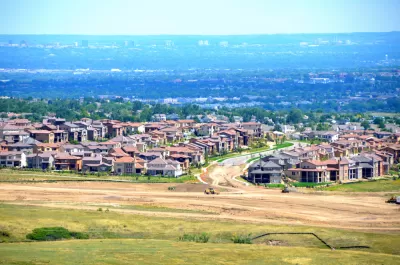The percentages have fluctuated on either side of the pandemic, but most Americans prefer to live in communities with larger houses, located farther away from schools, stores, and restaurants, according to a recent Pew Research Center survey.

The majority of Americans would prefer to live in communities with larger houses, located farther away from schools, stores, and restaurants, according to the latest edition of a Pew Research Center survey, conducted from March 27 to April 2, 2023.
“A majority of Americans (57%) say they would prefer to live in a community where ‘houses are larger and farther apart, but schools, stores and restaurants are several miles away,’” explains Ted Van Green in an article sharing the findings of the survey. “About four-in-ten (42%) would prefer a community where ‘houses are smaller and closer to each other, but schools, stores and restaurants are within walking distance.’
The share of Americans preferring larger houses and longer trips has dipped since the last survey, conducted in July 2021, when 60 percent of Americans stated this preference. “Public preferences were more evenly divided on this question in fall 2019, a few months before the coronavirus outbreak,” when the question polled at 53 percent and 47 percent, respectively.
The survey also produces obvious distinctions in preference along political lines, with 72 percent of Republicans and Republican leaners favoring larger houses and longer trips, and only 43 percent of Democrats and Democrat leaners preferring this arrangement.
Additional disaggregation by age, education, race and ethnicity, and ideology are detailed at the source article below.
FULL STORY: Majority of Americans prefer a community with big houses, even if local amenities are farther away

Maui's Vacation Rental Debate Turns Ugly
Verbal attacks, misinformation campaigns and fistfights plague a high-stakes debate to convert thousands of vacation rentals into long-term housing.

Planetizen Federal Action Tracker
A weekly monitor of how Trump’s orders and actions are impacting planners and planning in America.

In Urban Planning, AI Prompting Could be the New Design Thinking
Creativity has long been key to great urban design. What if we see AI as our new creative partner?

King County Supportive Housing Program Offers Hope for Unhoused Residents
The county is taking a ‘Housing First’ approach that prioritizes getting people into housing, then offering wraparound supportive services.

Researchers Use AI to Get Clearer Picture of US Housing
Analysts are using artificial intelligence to supercharge their research by allowing them to comb through data faster. Though these AI tools can be error prone, they save time and housing researchers are optimistic about the future.

Making Shared Micromobility More Inclusive
Cities and shared mobility system operators can do more to include people with disabilities in planning and operations, per a new report.
Urban Design for Planners 1: Software Tools
This six-course series explores essential urban design concepts using open source software and equips planners with the tools they need to participate fully in the urban design process.
Planning for Universal Design
Learn the tools for implementing Universal Design in planning regulations.
planning NEXT
Appalachian Highlands Housing Partners
Mpact (founded as Rail~Volution)
City of Camden Redevelopment Agency
City of Astoria
City of Portland
City of Laramie





























